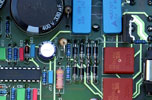
| Security Alarm • Fire Alarm • Video Surveillance • Solar • Power Electronics • Variable Signs • Overhaul & Maintenance • About Us |
| Intro |
| How It Works?! |
| Solar Panels |
| Charge Controls |
| Batteries |
| Inverters |
| Systems |
| System Calculator |
| Little Brother |
| Advices |
| Download Center |
| FAQ |
| Hrvatski |
 |
| Proizvodni program |
In only one hour the Sun scatters upon the Earth a volume of energy higher than the global consumption of a whole year. It is a free, renewable and non polluting energy. So, why not harness it?! That's what the photovoltaic technology does! Different from the solar water heaters, currently so common, the photoelectric effect converts the energy of light provided by the Sun into electric power, to feed lamps, TVs, water pumps and desalinators, computers, refrigerators or any other electric equipment. The increasing global demand for energy and the impact of the energy policies on the community and the environment create the need to look for an energy source capable of purvey humanity in an inexhaustible way and serve as basis to a sustainable development. Photovoltaic solar energy is being appreciated more and more, since the environment problems grow worse and the raw materials begin to exhaust, the continuous exploitation of fossil and nuclear fuels becomes intolerable to sustain the "power orgy" that our society is habituated to.
Solar Energy shows several advantages, mainly in countries like Brazil, that shows high insolation in quite all regions:
PV is the solution to supply power to sites where the grid doesn´t reach or when the supply is precarious. It is more and more used for rural lightning and communications, water pumping and electrification of cattle fences. Remote health stations are also benefited by Solar Energy. By using solar modules it is possible to power refrigerators to preserve vaccines, to supply lightning and communication. In the USA as in Europe the subsidized development of Solar Energy is giving to an increasing number of people the assurance that there is an economical and conscious answer for the electric power issue through the self-sufficiency and independence provided by this technology. Thanks to the explosion of the demand experienced within the last years, there are a growing number of organizations, user groups and magazines focus on independent power generation
Put simply, photovoltaic cells utilise sunlight to provide electricity. With no moving parts or chemical emissions, it's an effective way to reduce the damaging carbon dioxide emissions pumped into the atmosphere at the power station. Linked cells are encapsulated into modular panels - often a rectangular shape about a metre long. These are then interconnected to provide electrical power, which can be harmonised with grid electricity and fed back into the network. Providing power is used efficiently, an average south-facing house in the UK has sufficient roof area for modules to provide most of your electricity. Please note that there is a distinction between solar PV modules (which provide electricity) and solar water heating modules (which provide active water heating).
Solar PV is a non-polluting energy source, increasingly recognised as a major renewable technology for the future. Installing your own solar photovoltaic (PV) system means that you can generate your own electricity from the free and inexhaustible energy from the sun, and reduce your electricity bills. A photovoltaic system never needs refuelling, has no moving parts, emits no pollution, is silent, and requires minimal maintenance.
PV applications fall into two categories: standard bolt-on systems and integrated systems. Bolt-on systems literally bolt onto the existing envelope of the building (on top of your roof tiles or vertical façade). Integrated systems replace the existing envelope (replace roof tiles with PV tiles, or PV cladding replaces existing external cladding materials). PV grants are only available for equipment and work directly related to the PV system. This includes the cost of the modules, inverter(s), installation, grid connection and warranty. Unrelated building works are not eligible. Only modules and inverters that are approved can be used.
Thanks to its portability and ease of installation, Solar Energy may easily be applied to several other activity fields:
|